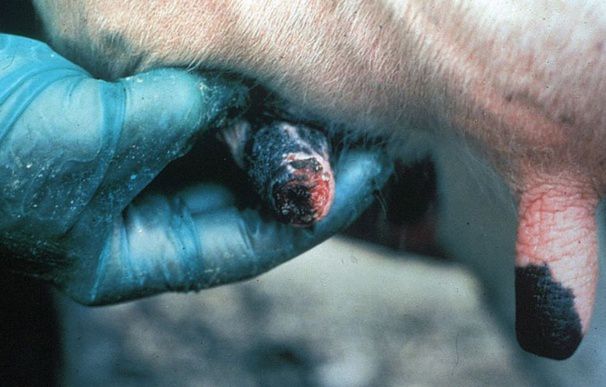Arizona Agriculture Alerted to Contagious Virus in Livestock
Published
5/8/2015
By Julie Murphree, Arizona Farm Bureau: Several animals in Maricopa County have been confirmed to have Vesicular Stomatitis Virus (VSV). VSV is a contagious virus which causes blister-like sores on the mouths, noses, teats and sometimes feet of infected animals. The Arizona Department of Agriculture is testing animals from a total of eight locations in Maricopa County.

A dairy cow infected with VSV.
For more information on VSV, a website provides details about the disease.
“Vesicular Stomatitis Virus mainly affects equine and to a lesser extent cattle and swine,” said State Veterinarian Dr. Perry Durham. “It can be painful for animals and costly to deal with.” The blisters are most likely to affect the mouth, the tongue and around the nose/muzzle. Pain from the blisters can make it hard for the animal to eat and drink. If cattle are infected, often the hooves and teats are involved leading to severe economic impact in dairy cattle.
In cattle, this virus is basically visually indistinguishable from Foot and Mouth Disease (FMD), a highly contagious and devastating disease. Tests on the affected steer for Foot and Mouth Disease came back negative.
Veterinarians and livestock owners who suspect an animal may have Vesicular Stomatitis or any other vesicular disease should immediately contact State or Federal animal health authorities. Livestock with clinical signs of Vesicular Stomatitis
Transporting Livestock
“If you are planning to take animals out of state, there are often restrictions that are placed by surrounding states with regards to importing animals from a quarantined area,” says Neil B. Holmes, DVM of Gila River Veterinary Services, LLC in Buckeye. “For the purposes of the World Pork Expo, for example, the animals can’t have come from an area within 10 miles of an outbreak. Currently, the general area of the outbreak
Doctor Holmes is keeping close tabs on the situation, especially as it relates to transporting animals. “Be aware, though, that moving to a different location will not necessarily help since where you are now is the premise origin,” he further explained.
Precautions to take
There is no specific treatment or cure for vesicular stomatitis in livestock. Livestock owners can protect their animals by avoiding congregation of animals in the vicinity where vesicular stomatitis has occurred. Good sanitation and quarantine practices on affected farms usually contain the infection until it dies out of its own accord. Owners are encouraged to control biting insects such as black flies and other flying and/or biting insects.
Supportive care such as fresh, clean water with or without electrolytes and soft feed such as silages and fresh grasses help. If secondary infection is present, antibiotics should be used. Prognosis is good for VSV infection but production losses can be permanent if the udder of cattle is affected.